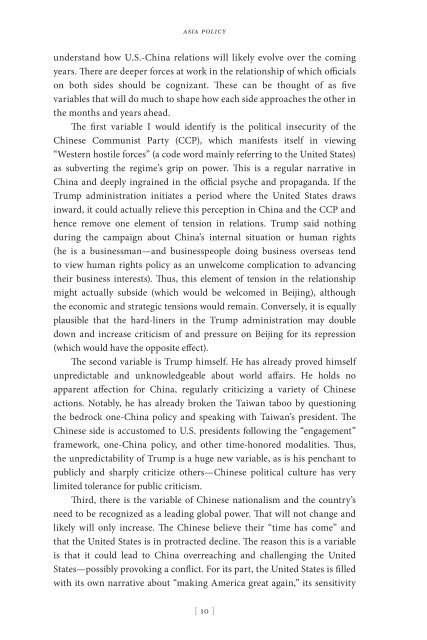2jBVKVf
2jBVKVf
2jBVKVf
You also want an ePaper? Increase the reach of your titles
YUMPU automatically turns print PDFs into web optimized ePapers that Google loves.
asia policy<br />
understand how U.S.-China relations will likely evolve over the coming<br />
years. There are deeper forces at work in the relationship of which officials<br />
on both sides should be cognizant. These can be thought of as five<br />
variables that will do much to shape how each side approaches the other in<br />
the months and years ahead.<br />
The first variable I would identify is the political insecurity of the<br />
Chinese Communist Party (CCP), which manifests itself in viewing<br />
“Western hostile forces” (a code word mainly referring to the United States)<br />
as subverting the regime’s grip on power. This is a regular narrative in<br />
China and deeply ingrained in the official psyche and propaganda. If the<br />
Trump administration initiates a period where the United States draws<br />
inward, it could actually relieve this perception in China and the CCP and<br />
hence remove one element of tension in relations. Trump said nothing<br />
during the campaign about China’s internal situation or human rights<br />
(he is a businessman—and businesspeople doing business overseas tend<br />
to view human rights policy as an unwelcome complication to advancing<br />
their business interests). Thus, this element of tension in the relationship<br />
might actually subside (which would be welcomed in Beijing), although<br />
the economic and strategic tensions would remain. Conversely, it is equally<br />
plausible that the hard-liners in the Trump administration may double<br />
down and increase criticism of and pressure on Beijing for its repression<br />
(which would have the opposite effect).<br />
The second variable is Trump himself. He has already proved himself<br />
unpredictable and unknowledgeable about world affairs. He holds no<br />
apparent affection for China, regularly criticizing a variety of Chinese<br />
actions. Notably, he has already broken the Taiwan taboo by questioning<br />
the bedrock one-China policy and speaking with Taiwan’s president. The<br />
Chinese side is accustomed to U.S. presidents following the “engagement”<br />
framework, one-China policy, and other time-honored modalities. Thus,<br />
the unpredictability of Trump is a huge new variable, as is his penchant to<br />
publicly and sharply criticize others—Chinese political culture has very<br />
limited tolerance for public criticism.<br />
Third, there is the variable of Chinese nationalism and the country’s<br />
need to be recognized as a leading global power. That will not change and<br />
likely will only increase. The Chinese believe their “time has come” and<br />
that the United States is in protracted decline. The reason this is a variable<br />
is that it could lead to China overreaching and challenging the United<br />
States—possibly provoking a conflict. For its part, the United States is filled<br />
with its own narrative about “making America great again,” its sensitivity<br />
[ 10 ]


